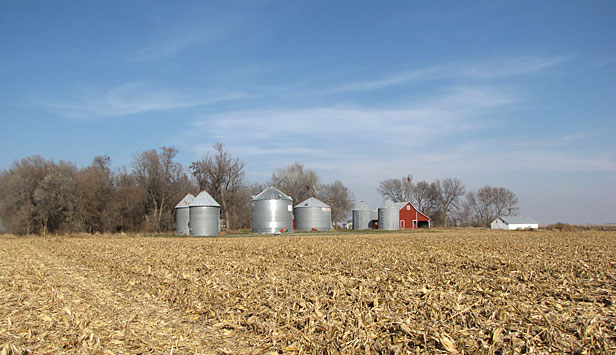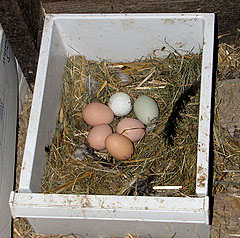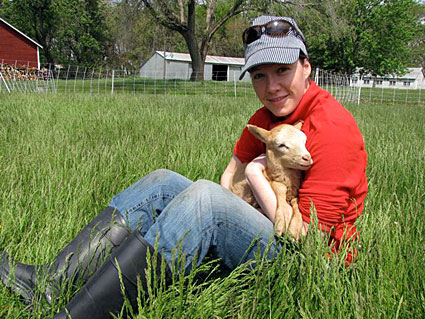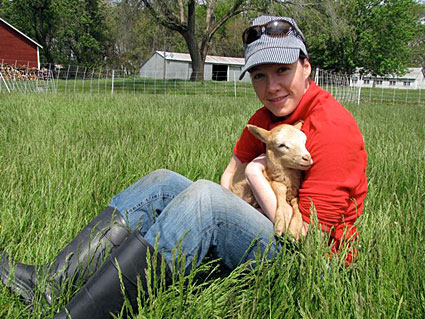 Our farmhouse and outbuildings.Photo: Steph Larsen
Our farmhouse and outbuildings.Photo: Steph Larsen
A year ago, we signed the deed for our 12-acre farm, and I prepared for a crash course in country living. I feel like I’ve lived a decade in the last 12 months here on Thistle Root Farm.
I never thought owning a small farm would be easy. I expected manual work, and there sure is a lot of that, but it’s so much more. It’s also about the ability to strategize while not knowing some essential information, such as what the temperature will be or how much it will rain. Working hard to build a plan, and being humble and flexible enough to throw the entire plan out the window if that’s what is needed. Truth be told, I’m a terrible planner, but I’m finding both the tools and the discipline to help me along. I’ve discovered that I like marketing and that I’m not much of a bookkeeper. (That’s what partners are for.)
In the garden, I reaped so much more than produce. I learned that effective weed control is like voting in Chicago — early and often. On that front, some mulching straw, newspapers and a sharp hoe will be my best friends next season. This year we have a basement full of squash, but maybe next year we won’t have any: I’ve learned to savor whatever we have while we’ve got it. When the cherries, apples and tomatoes were ready, I worked so hard to preserve them, but sometimes I had to surrender to the fact that I couldn’t harvest everything in time.
 Our hens prefer old plastic fridge drawers to steel nesting boxes. When the idea of having a farm began to take form, getting livestock was both exciting and terrifying. Animals tie you to a place in a way that very little else does. You can take children with you on a roadtrip, for example — not so much a flock of sheep. The animals are a joy for me, however, and I’ve spent many extra hours watching them play, plotting how to get them to do what I want, learning their natural tendencies, and watching for and avoiding problems.
Our hens prefer old plastic fridge drawers to steel nesting boxes. When the idea of having a farm began to take form, getting livestock was both exciting and terrifying. Animals tie you to a place in a way that very little else does. You can take children with you on a roadtrip, for example — not so much a flock of sheep. The animals are a joy for me, however, and I’ve spent many extra hours watching them play, plotting how to get them to do what I want, learning their natural tendencies, and watching for and avoiding problems.
To be sure, animals can be frustrating because they have minds of their own and don’t necessarily do what you’d like them to do. I’ve nearly stepped on chicken eggs in the middle of a flower bed and chased sheep all over the farm. But out of that frustration comes an outlet for creativity — I’d never have guessed that my hens would forgo steel nesting boxes for old plastic refrigerator drawers, but I’m glad I tried it.
 One of our first lambsLast year I wasn’t sure whether I’d be capable of raising an animal from infancy, giving it a good life, and — with the proper amount of respect, reverence and sensitivity — eventually eating it for dinner. While it will bother some readers, it turns out that I am capable of eating meat I’ve raised. I eat more thoughtfully than before, though, and it entrenches my distaste for the so-called conventional methods of raising livestock.
One of our first lambsLast year I wasn’t sure whether I’d be capable of raising an animal from infancy, giving it a good life, and — with the proper amount of respect, reverence and sensitivity — eventually eating it for dinner. While it will bother some readers, it turns out that I am capable of eating meat I’ve raised. I eat more thoughtfully than before, though, and it entrenches my distaste for the so-called conventional methods of raising livestock.
Living in the country can be isolating in the winter, and I’m not eager to repeat the days we spent without electricity, due to an ice storm, or having six inches of water in our basement after a downpour. But it’s amazing what good neighbors and a 4×4 truck can fix. I’m lucky enough to have both, and I hope I never take either one for granted.
When I sit in my snug new living room and look out at the pasture that wasn’t there last year and the barns that are back in use after so many year standing idle, I can’t help but be incredibly thankful that this is my life. It’s been a hard year, and I’m tired. But fulfilled. And I know I’ll do it better next year.



